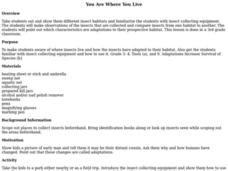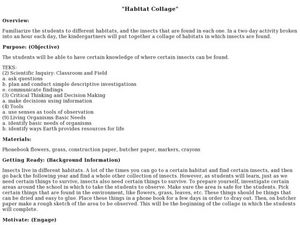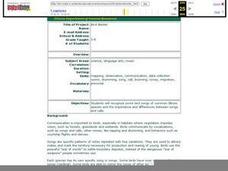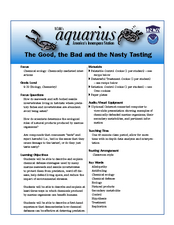Curated OER
You Are Where You Live
Third graders observe insects in a number of habitats. They recognize which insect characteristics are adaptations to their habitats.
Curated OER
Birds of Different Feathers: Species Specialization
Students identify differences in bird species and explain the concept of species specialization. They attain the knowledge that different birds occupy different habitats.
Students identify characteristics and features of birds that make...
Curated OER
Reclamation and Recycling
Students learn the importance of plants and animals, ecosystems and habitats... and see how these factors guide mining reclamation projects. They then discover the importance of recycling, and the difference between manufacturing with...
Curated OER
Something's Fishy
Fourth graders identify parts of a fish. In this fish anatomy lesson, 4th graders identify parts of fish in a group setting and then complete a worksheet about the parts of a fish.
Curated OER
Where Are the Dinosaurs?
Students explore what the dinosaurs were like. In this dinosaur lesson, the teacher peaks student curiosity about dinosaurs. This lesson would be a great starting point for a dinosaur unit since it primarily engages student interest and...
Curated OER
Graphing Water Temperature
Students graph water temperature using probe software and a Palm on a class field trip to a lake or pond. Emphasis is placed on collaboration with high school science students and the use of ImagiProbe software.
Curated OER
Bird Banter
Students listen to examples of common bird songs of birds found in Illinois. As a class, they discover the importance between the differences in songs and calls. They practice making their own bird calls and songs to end the lesson.
Curated OER
Wanted!!
Fourth graders study insects in their habitats looking at survival characteristics and whether the insect is a predator or an herbivore. They investigate characteristics that improve the survival of a species and its ability to reproduce.
Curated OER
Crazy Critters
Eighth graders visit a local park to collect insects. They record the habitats, identify the insect and write a report including the kingdom, phylum, class, and order.
Curated OER
The Good, the Bad and the Nasty Tasting
Students examine the effect of chemicals from marine plants or animals on predator's preferences. In this ecology lesson, students conduct taste tests and collect necessary data. They write their conclusion after analyzing...
Curated OER
Water, Water Everywhere (Pond Animals)
Second graders examine the characteristics of animals who live in a pond environment. In groups, they describe the various stages in the life of a frog and identify the characteristics of other pond animals. Using this information,...
Curated OER
Animal Adaptations
Learners expand their knowledge of animal features and behaviors that can help or hinder their survival in a particular habitat. They participate in classroom discussions and visit a website to research animals
Curated OER
Environmental Problems and Solutions
In this environmental problems and solutions worksheet, students are given a list of 25 environmental problems. They match them with a given solution and paste the matching pairs to a piece of construction paper.
Curated OER
Native Species Restoration and its Impact on Local Populations
In this native species restoration worksheet, young scholars are given 3 scenarios to choose from to help restore a declining population of an endangered species of deer. Students make predictions about what they will think happen when...

















